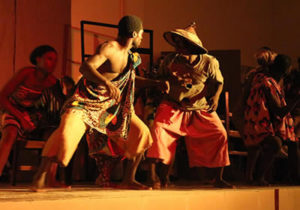Emancipation Day and PANAFEST: Unveiling the lessons of unity, heritage, and modern Challenges
 As Ghana celebrates Emancipation Day and PANAFEST, it is crucial to reflect on the profound lessons these events offer. Emancipation Day, observed annually to commemorate the abolition of slavery in the British colonies, and PANAFEST, a biennial cultural festival, serve as powerful reminders of Africa’s rich history and the ongoing journey towards unity and healing.
As Ghana celebrates Emancipation Day and PANAFEST, it is crucial to reflect on the profound lessons these events offer. Emancipation Day, observed annually to commemorate the abolition of slavery in the British colonies, and PANAFEST, a biennial cultural festival, serve as powerful reminders of Africa’s rich history and the ongoing journey towards unity and healing.
This year’s PANAFEST celebration is scheduled to take place from July 23 to August 2. This biennial festival, held in Cape Coast and Elmina, celebrates Pan-African arts and culture, providing a platform for Africans on the continent and in the diaspora to connect and reflect on their shared history and future.
On June 11, 2024, the Ghana Tourism Authority launched the 2024 edition of the Emancipation Day celebration in Accra. The celebrations will take place from July 22 to August 1, 2024 under the auspices of the Ministry of Tourism, Arts and Culture.
A unified celebration of heritage and liberation
Emancipation Day, first celebrated in the Caribbean on August 1, 1834, and observed in Ghana since 1998, marks a pivotal moment in the fight against slavery. This year’s theme, “Emancipation, Our Heritage, Our Strength and PANAFEST,” reflects a combined celebration of freedom and cultural renaissance. Emancipation Day, anchored by the Ministry of Tourism, highlights Ghana’s role as the gateway for the African Diaspora to reconnect with their ancestral roots.
PANAFEST, established in 1992, embodies a broader vision of Pan-African unity and cultural revival. With its vibrant display of African arts, including music, drama, and poetry, PANAFEST aims to strengthen Pan-Africanism and enhance Africa’s global cultural presence. The festival features a durbar of Chiefs, tours of historical sites, and cultural performances that underscore Africa’s rich heritage and resilience.
Unveiling the lessons: Healing and unity
The intertwined narratives of Emancipation Day and PANAFEST offer valuable lessons on unity, healing, and historical acknowledgment. These events highlight the need for a collective understanding of Africa’s history, particularly the dark legacy of the Trans-Atlantic Slave Trade. Recognizing the horrors and injustices of slavery is crucial for healing deep-seated wounds and preventing the recurrence of such atrocities.
The commemoration of the slave trade at heritage sites like Cape Coast Castle and Elmina Castle serves as a powerful reminder of the suffering endured by countless Africans. These sites, alongside other landmarks such as Assin Manso and Salaga, provide tangible connections to the past and foster a sense of collective memory and responsibility.
Addressing modern challenges through historical reflection
One of the critical lessons from these celebrations is the importance of addressing modern forms of slavery and exploitation. Despite the abolition of chattel slavery, contemporary issues such as human trafficking, forced labor, and child exploitation persist. Emancipation Day serves as a platform to draw parallels between past and present injustices, emphasizing the need for continued vigilance and action against modern slavery.
The narratives of Emancipation Day and PANAFEST also underscore the necessity for economic and social reforms. The challenges faced by the tourism sector in Ghana—such as inadequate funding, poor infrastructure, and lack of strategic planning—highlight the need for more robust support and investment in cultural and historical preservation. Enhancing domestic tourism through better education and resource allocation can elevate the impact of these events and ensure their sustainability.
Creating lasting impact through strategic planning
While the celebrations have succeeded in drawing attention to Africa’s heritage and the legacy of slavery, there remains a need for continuous evaluation and improvement. The recurring challenges—financial constraints, logistical issues, and limited patronage—suggest a need for more effective planning and resource management.
To achieve lasting impact, it is crucial to assess past events, identify strengths and weaknesses, and implement strategies for improvement. This includes increasing budget allocations for the Ministry of Tourism, developing infrastructure, and fostering repeat visits from the Diaspora. By addressing these areas, Ghana can enhance the significance of Emancipation Day and PANAFEST, ensuring they contribute more effectively to cultural unity and economic growth.
Conclusion:
Embracing heritage for a unified future
Emancipation Day and PANAFEST are not just annual events but powerful symbols of Africa’s journey toward unity, healing, and cultural renaissance. They offer valuable lessons in acknowledging historical injustices, addressing modern challenges, and investing in cultural preservation. As Ghana continues to celebrate these events, the focus must be on creating a more inclusive, resourceful, and strategic framework to ensure their continued success and impact. Through these efforts, Ghana can strengthen its role as a beacon of African heritage and a leader in the global dialogue on freedom and unity.
By Innocent Samuel Appiah
